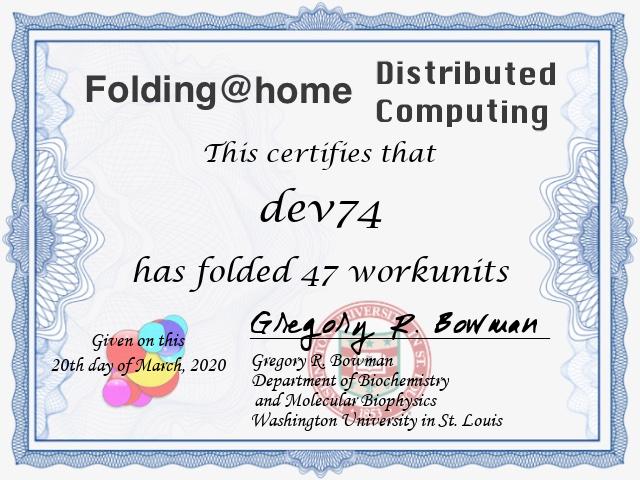
Given the moment, like me, many others would like to contribute in one way or another to the fight against this pandemic that has been raging on the planet for months now, threatening our daily lives, but what if our specialization is not involved in the front line ? There are many ways to make a contribution that can in one way or another help the community in the fight against the coronavirus, one of these for those who have a minimum of mastery with a computer could be to participate in distributed computerized computing for protein folding related to COVID-19. All of us today have at least one computer at home, one in the studiolo, maybe an HTPC under the TV ? Maybe a notebook that we use for the holiday and now it's in the drawer...? Well we can use them all and combine the computing power of our devices to contribute to the fight against Coronavirus and many other diseases thanks to the Folding@Home project. All you have to do is download a small program that will allow you to share the computational power of your PC with a distributed network of computers, in this way the additional computing power will make faster the processing of models that could lead to a cure that quickly defeats the Coronavirus, that's how to do it:
- Download the Software Client directly from here (Available for Windows MAC Os and all common Linux distributions)
- Launch it and proceed with the installation (I have chosen the advanced installation where you can choose whether to activate the client automatically when starting windows or at your own discretion)
- Once installation is complete, the Client settings link will appear, a double click will be enough to access it and you can select both the computing power to donate and when to do so so that you can continue to use your computer without compromising your computing activities.
If you have more than one computer, you can install the client and set it up so that it can take full advantage of the power of the device and donate all the computational "power" produced by the computer that you are not normally using. It is also possible to be recognized by the system by providing a name or pseudonym and a special passkey that you can get directly from here.
Once in possession of the identity you will be able to access statistics for people and teams that have joined to earn points and compete with other teams. One of the best ways to help Folding@home is to recruit friends and family. Start sharing our project with them. Then join a team or start creating your own team. The more points your team earns, the closer we get to finding treatment.
The Windows client of the Folding@Home project also boasts the possibility to view real-time 3D models of the proteins under examination, providing a rather attractive graphic picture of what you are helping to calculate and as if that were not enough, it also allows you to obtain small participation certificates that can be downloaded and collected. Human solidarity has given excellent results and I hope that this contribution will continue over time until final results are achieved.
- Italian situation map - Versione DeskTop
- Italian situation map - Versione Mobile
- World Situation Map - Versione DeskTop
To date 19/03/2020 riding the wave of drama caused by the Coronavirus epidemic the project has begun to collect a computing power of about 1.5 ExaFlop, such power is so high that it seems to diminish that of the most powerful supercomputers on the planet! To better understand the magnitude of this enormous computing power just think that a similar initiative promoted by IBM for the calculation of protein folding in relation to the fight against the Coronavirus that has combined the computing power of 16 of the most powerful supercomputers in the world, including those managed by MIT and NASA, has reached 330 PetaFLOPS, or 0.33 ExaFLOPS.


Leave a Comment